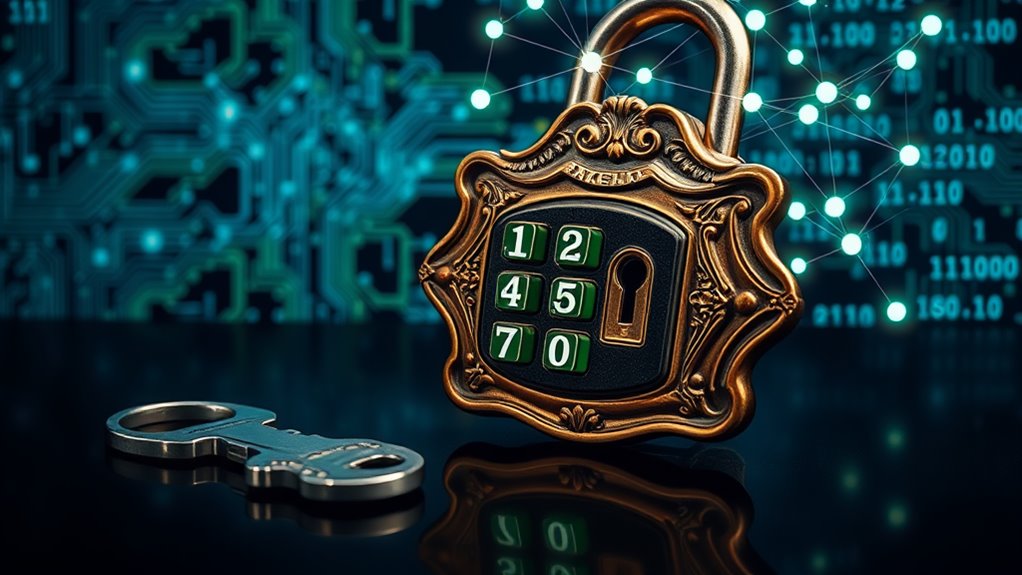What Is Cryptography?
Note: This post may contain affiliate links, and we may earn a commission (with No additional cost for you) if you make a purchase via our link. See our disclosure for more info. The crypto world is constantly changing. This content is for informational purposes only and not financial, legal, or professional advice So, please verify the info on the cryptocurrency provider’s websites.
Cryptography is basically the secret sauce that keeps your digital life safe. It locks up your data, turning it into gibberish only authorized folks can read. Think of it as a high-tech bouncer at the door of your personal information, making certain only the right people get in. It also guarantees what you send and receive hasn't been tampered with. Curious about how that all works? Stick around to unwrap the mystery of encryption!

Cryptography is like the unsung hero of the digital age. It's the secret sauce behind the curtains, making certain our online lives aren't just open books for anyone to read. Without it, the internet would be a wild west of data breaches and identity theft. Seriously, who wants their personal emails or credit card info splashed across the web like some public service announcement? Not anyone with a shred of sense.
The core principles of cryptography are straightforward yet essential. First up is confidentiality. This means only the people who should see your data can actually see it, thanks to encryption algorithms. Imagine your secrets wrapped in an unbreakable vault.
Confidentiality is key in cryptography—only the right eyes see your secrets, safely locked away by encryption algorithms.
Then there's integrity. This nifty trick uses hash functions and digital signatures to guarantee that your data hasn't been tampered with. It's like putting a seal on your pizza box—if the seal's broken, you know something's off.
Authenticity follows closely behind. It's all about verifying identities. Who's sending that email? Is it your friend or a clever impersonator? Digital signatures and Public Key Infrastructure (PKI) help sort that out. Nobody wants to be fooled.
Data protection? Oh, that's a given. Information needs to be safe during storage and transmission. Otherwise, what's the point? Cryptography also utilizes a pair of keys to provide secure communication without a shared secret key. The importance of cryptography in securing secure digital communications cannot be overstated.
Let's not forget non-repudiation. This fancy term means that once you send a message, you can't just deny you did it. Cryptographic signatures keep everyone accountable. If you think you can just back out, think again.
The techniques are cool, too. Symmetric encryption uses one key, while asymmetric encryption plays with public and private keys. There are algorithms like AES for secure data transmission and RSA for key exchanges. These cryptographic foundations are what enable blockchain networks to maintain immutability and security in cryptocurrencies.
Oh, and hash functions like SHA-256? They're the gatekeepers guaranteeing data integrity.
Cryptography is everywhere, quietly working behind the scenes, keeping the digital chaos at bay. It's time we give it some credit.
Frequently Asked Questions
How Does Cryptography Impact Everyday Online Activities?
Cryptography is everywhere, shaping daily online life. Without it, sending a text or shopping online would feel like shouting secrets in a crowded room.
Thanks to encryption, messages stay private, and bank details remain under wraps. But it's not all sunshine; as tech evolves, so do threats.
Quantum computers? Yeah, they're coming for your security. So, while you scroll and shop, remember: cryptography is your unseen guardian, battling the bad guys behind the scenes.
What Are the Main Types of Cryptography?
When it comes to types of cryptography, there are two main players: symmetric and asymmetric.
Symmetric uses one key for everything—great for bulk data but watch out for key distribution issues. Think AES or Blowfish, but good luck keeping that key safe!
On the flip side, asymmetric takes a more complicated approach. It uses a pair of keys—public and private—making it safer but way slower.
It's like the tortoise and the hare, but with data.
Can Cryptography Be Broken or Hacked?
Sure, cryptography can definitely be broken or hacked. Just look at weak keys and outdated algorithms—it's like leaving your front door wide open.
Side-channel attacks? Yeah, they're real. Timing and power leaks can spill secrets faster than a gossiping neighbor.
And don't forget about quantum computers; they might just blow traditional encryption to smithereens.
What Role Does Cryptography Play in Blockchain Technology?
Cryptography is the superhero of blockchain. It locks down transaction data tighter than a drum, keeping snoopers at bay.
Digital signatures? They're like personal stamps of approval, confirming who sent what.
And those hash functions? They're the immovable glue holding everything together. You can't just mess with them!
Without this digital fortress, the whole blockchain could crumble.
How Can I Learn More About Cryptography?
To plunge into cryptography, one could hit the books—seriously.
"Real-World Cryptography" is a good start, or try "Understanding Cryptography" for those who love math.
Online courses? Yes, please! Check out Dan Boneh's course on Coursera.
Need something hands-on? CryptoHack's challenges are fun (and a bit brutal).
You'll learn, maybe even break something. Just don't expect it to be easy. It's cryptography—nothing about it screams simple or straightforward.










